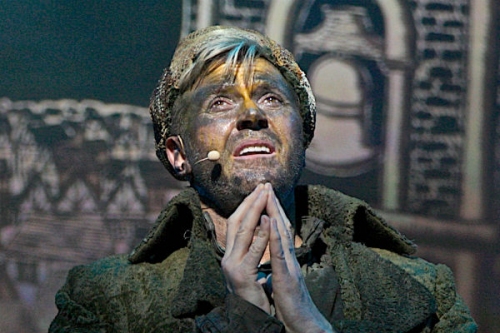In BUMBLESCRATCH, “Melbourne Bumblescratch” serves as both narrator and protagonist.
Narrators are supposed to be reliable characters, especially when we find them in a musical comedy context. They guide us through the story. And if the narrator also happens to be the story’s protagonist, then this quality of trustworthiness becomes that much more an aspect of the character’s overall persona.
BUMBLESCRATCH turns this notion on its head however, as I shall explain. And I must admit, the idea of creating an untrustworthy narrator/protagonist for a musical intrigued me. We have come to expect musical comedy protagonists to be straight shooters. They tell their audiences their “I wants” early on in a show and in turn, these revelations facilitate the fluidity of the narrative.
Indeed a songwriter will often write (what’s known in the business as) an “I Want Song” for the protagonist to sing. Then, through the course of the ensuing two hours the audience becomes emotionally invested in the protagonist’s journey. We clearly know what the protagonist wants and catharsis is reached when he fulfills his quest. This is the paradigm in musical comedy writing.
Darker musicals explore the “what ifs” should the protagonist’s aspirations and his achievements not quite square up. For example, in Sweeney Todd, the title character attains the revenge he so intensely craves, but he inadvertently kills his one true love in the bargain. Despite this tragic sequence of events, the protagonist/narrator deals honestly with his audience.
BUMBLESCRATCH overturns this convention. More a character spawned of Salinger than of Sondheim, Melbourne is unusually dishonest and untrustworthy. He lies to everyone including his own guardian angel and to the audience. He even lies to himself. This is because he is a rat; a cunning, conniving creature by nature.
Add to this a dash of deep-seated self-loathing: It is only when Melbourne learns to face and forgive himself that he is freed to embrace who and what he truly is - and when he does, it is then that he is ultimately redeemed.
As a society, we have somehow unwittingly stumbled into a grim new era filled with untrustworthy, dark narrators and despicable protagonists. I like to think that perhaps, if Melbourne can find his way to redemption, then maybe so can we. Melbourne gives us all some hope - and maybe just maybe, shows us the way out of hell.



